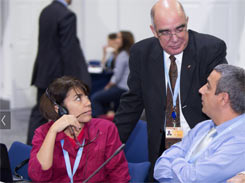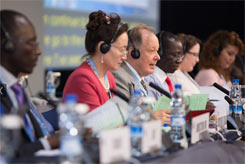ITU’s commitment to eHealth underlined in Dubai
The ITU has renewed its commitment to help accelerate the global development and adoption of health information and communication technologies to improve healthcare and bring down costs, particularly in developing countries.
At a special event on "Technical Requirements for Large Scale Deployment of eHealth Innovations" held on the sidelines of WTDC-14 Mr. Yushi Torigoe, Deputy Director of ITU's Telecommunication Development Bureau (BDT), speaking on behalf of the BDT Director, Mr. Brahima Sanou, said "There is strong evidence that smart, innovative solutions, such as mobile technologies can facilitate healthcare, save lives and cut healthcare costs on an unprecedented scale and can make a real difference to people around the world," and noted that many current efforts to develop eHealth are "duplicative and fragmented" which adds to its cost and complexity.
In light of these problems there is a pressing need for an integrated and holistic platform approach to the deployment of scalable eHealth solutions that reflect appropriate integration, respect regulatory boundaries and apply relevant open and shared standards in order to break down barriers to a more widespread uptake of eHealth.
At the same time the increasing pressures on many countries' health systems from an ageing population, increased rates of chronic and infectious diseases, and health workforce challenges, means it is critical to consider opportunities to deliver high-quality services more effectively and efficiently using the power of ICT.
While several governments have implemented national strategies, set targets, allocated significant resources and established coordination bodies to promote the widespread use of ICTs in the health sector, it was noted that many countries are still lagging behind in this area.
To help plug this gap, it was recalled that BDT and WHO had jointly published the National eHealth Strategy Toolkit, a practical guide designed to help governments and health ministries adapt and implement health strategies according to their circumstances and goals. Furthermore, BDT co-organized a series of regional workshops in 2013 attended by officials from some 40 countries with a view to building capacities in developing national e-health strategies.
Government officials, private health sector representatives and delegates attending the special event also heard that BDT had recently published a report on ICT for Improving Information and Accountability for Women's and Children's Health, highlighting contributions ICT applications can make towards implementing related millennium development goals.
In another joint initiative with WHO, and engaging several partners from the private sector, BDT has launched the
Be Healthy, Be Mobile campaign which focuses on mobile technology use in support of preventive action against non-communicable diseases such as cancer, heart disease, strokes, lung disease and diabetes. This initiative is contributing to BDT's recently launched broader
m-Powering Development initiative which aims to unleash the transformative potential of mobile communications to improve the lives of all citizens worldwide.
The Be Healthy, Be Mobile initiative has so far been introduced in Costa Rica where it has inspired a national mHealth service to help people stop smoking, and in Senegal where it is helping to prevent and control diabetes, and to provide related training to community health workers and general practitioners, especially in rural areas. Plans are afoot to introduce the initiative in other countries.
Mr. Sanou's message transmitted to participants noted that the initiative "recognizes the particular strengths of the private sector and that the resources of government and philanthropy alone are insufficient to address the world's biggest challenges".
The special event also heard presentations on lessons learnt and best practices from leading private sector technology partners who have longstanding experience in addressing the challenges involved in developing the large-scale deployment of eHealth innovations.
Patrick Coomans, a senior identity strategist with Verizon, and Philip Kelley, director of wireless standards at Alcatel-Lucent, identified some of the major obstacles holding back the large-scale introduction of eHealth solutions. These include the lack of a common legal, interoperability, testing and certification frameworks that contributes to market fragmentation. As a result, ICT solutions are tailored only for one specific location or service provider and thus risk being more expensive and non-interoperable elsewhere.
|
 Newsroom Newsroom
Website
Photos
Videos
Social Media Round-up
Photos and videos
m-Powering Development Initiative
Interview with Brahima Sanou, Director, BDT
WTDC-14 Interview:
Patrick Coomans, Manager, Global Solutions Development, Verizon Enterprise Solutions


|
